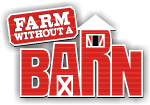SEA SOIL™ is Great for Vegetable Gardens
20 Oct 2009 | 12:00 AM PDT | Posted by seasoil.com Staff | Category: Fruit And Vegetable Gardening
SEA SOIL™ is great for vegetable gardens. I do however, recommend that it NOT be used in FULL strength for vegetable seeds. Germination is excellent, but, I always get tall, spindly fast-growing plants when I seed directly into it.
Although I transplant vegetables plants directly into SEA SOIL™, I would still recommend mixing it down to about fifty per cent. On the other hand, I do use it full strength when seeding annual and perennial flower seeds and also with transplants in my flower beds, planters, pots etc. as with my trees, shrubs and bushes.
When transplanting nursery annual and perennial flowers, I like to mulch in a fair amount of SEA SOIL™ to a depth of six inches or so. I trowel an appropriate sized hole for each plant and place a nice scoop of SEA SOIL™ in it and then the plant. I fill in the soil and generously water it. I always spread at least two inches of SEA SOIL™ as a ground cover over my entire garden, as it is not only attractive, but it will help retain the moisture. I use the same method for transplanting shrubs, trees and bushes. I have not found a plant, shrub or bush that does not like SEA SOIL™. Do remember to water as much as you possibly can, even during a drought, especially within the first two years of transplanting perennials, shrubs, trees or bushes to establish good root growth.
SEA SOIL™ is excellent for retaining moisture, something I personally found true while being away at garden shows.
I have utilized SEA SOIL™ "as is" in pots and planters, however, you can have great results also by mixing it down. I have found that some plants grow instantly but fish nitrogen is an organic nitrogen which historically starts slower than one in commercial form. I have been known to be impatient at times and have added a small amount of commercial nitrogen to speed things up and have always regretted it later. I wind up with spindly plants because the fish nitrogen will kick in and produce great growth on its own. The benefits of SEA SOIL™ were scientifically proven to remain in the soil for years after application as per our logging road trials we undertook in partnership with UBC Forest Sciences. (see SEA SOIL™-Industrial Uses). Adding SEA SOIL™ several times a year will assist in making your garden soil healthy and productive.
I like to keep a few bags of SEA SOIL™ handy for several reasons. Because I like to fuss over my plants, I will add several scoops of SEA SOIL™ to pots and planters every so often-that way I feel as though I am doing something to nurture them. (Gardeners will understand this feeling.) I get into a phase of moving plants around and have the SEA SOIL™ nearby to patch up around plants as I really like the uniform look it gives the garden. I also use SEA SOIL™ to fill holes our dogs dig in the lawn and garden. SEA SOIL™ loves grass seeds and has an excellent germination record. I find my plants are very hardy-they survive the dogs quite well.
 I have found a fall application of SEA SOIL™ to produce beautiful perennials in Spring. I have noticed that every seed that drops seems to sprout so I have become more selective as to where I shake those seeds in fall!
I have found a fall application of SEA SOIL™ to produce beautiful perennials in Spring. I have noticed that every seed that drops seems to sprout so I have become more selective as to where I shake those seeds in fall!
I try very hard not to begin gardening on the first beautiful week-end to allow the sun to warm the ground before I begin tilling in last fall's SEA SOIL™ (being careful around perennials). I then add a nice fresh layer of our product which will provide my plants with nutrients and organic matter for the spring and summer. (Always remove weeds first before applying SEA SOIL™-my yard is now virtually weed-free!)
Upcoming Events
There are no events to display.
Search
Blog Categories
Growing Your Soil
Not the Landfill. All of our bags, pallets and pallet wrap can be recycled. Our plastic is made from no. 4 LDPE (Low-density polyethylene) plastic which can be recycled by returning clean, dry, empty plastic bags to recycling drop off centers or retailers and municipalities (curbside collection also) that provide designated plastic bag recycling. Wooden pallets can be reused or recycled at designated wood recycling areas with your municipality.
OMRI Tested
We believe that all soils should have a required minimum set of testing standards when it comes to growing. That is why we contacted O.M.R.I. years ago to start the process of approving SEA SOIL. We regularly test our SEA SOIL for heavy metals, ecoli and even fecal coliforms to make sure SEA SOIL is the best choice for gardeners and growers.



